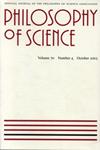比较学习
IF 1.4
2区 哲学
Q1 HISTORY & PHILOSOPHY OF SCIENCE
引用次数: 1
摘要
摘要本文研究了比较自信判断的历时理性规范,即“我对p至少和我对q一样自信”形式的判断。具体来说,它识别、描述和评估了一种直觉上令人信服的学习规则,称为“比较条件化”,该规则规定了智能体在面对新证据时应该如何修改他们的比较信心判断。本文章由计算机程序翻译,如有差异,请以英文原文为准。
Comparative Learning
Abstract This paper concerns the diachronic rationality norms for comparative confidence judgements , i.e. judgements of the form ‘I am at least as confident in p as I am in q ’. Specifically, it identifies, characterises and evaluates an intuitively compelling learning rule called ‘comparative conditionalisation’ that specifies how agents should revise their comparative confidence judgements in the face of novel evidence.
求助全文
通过发布文献求助,成功后即可免费获取论文全文。
去求助
来源期刊

Philosophy of Science
管理科学-科学史与科学哲学
CiteScore
3.10
自引率
5.90%
发文量
128
审稿时长
6-12 weeks
期刊介绍:
Since its inception in 1934, Philosophy of Science, along with its sponsoring society, the Philosophy of Science Association, has been dedicated to the furthering of studies and free discussion from diverse standpoints in the philosophy of science. The journal contains essays, discussion articles, and book reviews.
 求助内容:
求助内容: 应助结果提醒方式:
应助结果提醒方式:


